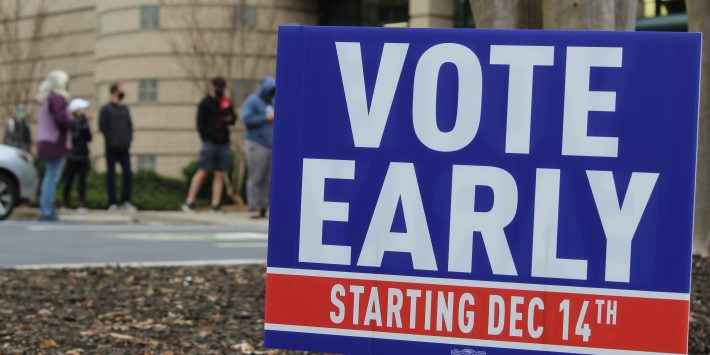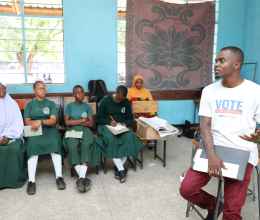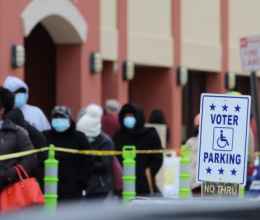Republicans In Georgia Senate Begin Moving Bills That Would Revamp Election Process
Republicans In Georgia Senate Begin Moving Bills That Would Revamp Election Process
By Christopher Alston and Emil Moffatt | WABE | February 17, 2021
Other Pages
Georgia lawmakers voted along party lines Wednesday morning to move several pieces of legislation one step closer to law, including measures that would add restrictions to absentee voting. The votes took place in simultaneous Senate Ethics subcommittees.
Senate Bill 71, sponsored by Sen. Jeff Mullis of Chickamauga, would end Georgia’s no-excuse absentee system that has been in place since 2005 and instead require voters to give a reason why they should be allowed to vote absentee. The approved reasons include age, disability, and being out of the county at the time of the election, among others. Voters would need to provide some form of supporting documentation.
Mullis said he believed his district underperformed in voter turnout during the most recent election cycle because of a lack of voter confidence in the security of the election.
“We’re just trying to put it back to the way it was, to make sure voter confidence is reestablished in my area and many parts of Georgia that I think have lost confidence in the election process,” Mullis said."
Sen. Sally Harrell, a Democrat from Atlanta, asked Mullis how legislators could know whether the pandemic will have ended by the next election.
“How do you know these people who voted by mail to protect their health won’t be thrown out into the public where they can be exposed to this virus and get sick?” she asked.
Sen. Mullis said he would be open to considering a lower age requirement, the current bill has it set at 75 years or older.
Sen. Harrell said that voter’s belief the election was fraudulent is due to lies spread by former President Trump, and the solution is “leadership not legislation.”
The same subcommittee also voted 3-2 to pass Senate Bill 67, which requires voters to submit their date of birth and their driver’s license or state ID number, or a photocopy of their ID, with their absentee ballot application.
“The purpose of this proposal is not to make it harder to cast a legal ballot, but to make it harder to cast an illegal ballot,” said Republican Sen. Larry Walker, the bill’s author. “To provide ID uniformity between in-person and mail-in or drop-off ballots, and to provide greater security in our elections so the public can have confidence and trust in the integrity of our election results.”
Democratic senators on the subcommittee said that the bill excludes Georgians that do not have a driver’s license. They also raised the concern of identity theft when mailing identifying pieces of information, but Republicans said there is still a risk when using the internet.
Voters who apply for an absentee ballot online already have to submit their driver’s license information and voters who cast a ballot in-person must show ID.
Chris Bruce, political director for the ACLU of Georgia, testified that the bill would place older Georgians at risk for identity theft, and he said that both bills place Georgia in a small minority of states with these restrictions on absentee voting.
“Taking away the longstanding ability of Georgians to decide for themselves if absentee voting is right for them will cause long lines, and transfer the burden to poll workers and voters,” Bruce said.
A separate Senate subcommittee passed a pair of bills Wednesday morning that will provide more oversight by the state and restrict the use of mobile voting units.
Senate Bill 89 passed by a 3-1 vote, with Sen. Harold Jones, a Democrat, voting no. The bill creates the position of a chief elections assistance officer within the secretary of state’s office.
The bill’s sponsor, Republican Butch Miller, says the new position would be responsible for conducting training for county elections officials.
“I would say that there are 159 different counties and we’re probably doing it 159 different ways,” said. Sen. Miller. “This elections assistance officer would be able to present best practices, present opportunity for jurisdictions to create processes and procedures that would be consistent across the state and making sure that the workload is handled.”
Much of that work was done during the past election cycle by Chris Harvey, the state’s election director. He was in constant contact with counties. There were also training materials provided by the state to counties on best practices.
Under Miller’s bill, the chief elections assistance officer would conduct the evaluation “to ascertain as to whether the county superintendent of the low-performing jurisdiction should be replaced” and then make recommendations to the state elections board.
Todd Edwards with ACCG, a group that advocates for Georgia counties, called Senate Bill 89 “a great bill” but also wants county commissioners or county election board to have input on if a “failing” elections superintendent is recommended for removal.
Edwards also noted that counties did receive training in the 2020 election cycle, but could always use more.
“A lot of them did have training, we had a lot of professionals in there, but a lot of them got sick, a lot of them are elderly, they couldn’t make it this time around,” said Edwards. “More training can help that, but you never can quite prepare for a situation like that.”
Also by a 3-1 party-line vote, Republicans on the subcommittee approved a bill that would restrict the use of mobile voting units to when a normal polling place was deemed unfit for use.
Fulton County purchased two mobile voting units that were used during early voting in the last part of the 2020 election cycle. In a schedule approved by the Fulton County board of elections, the buses were assigned to different county commission districts on different days, to make sure each district benefited from them.
Recent Georgia State graduate Nicolas Northen, a contractor for Fulton County, helped train poll workers. He told the committee after a few days of working out technical issues, the buses worked well.
“They are really a huge asset to the voters of Georgia, who in my experience absolutely enjoyed voting on these machines,” said Northen. “It’s extremely secure and they do meet the standards set forward by the secretary of state.”
Savannah Rogers, a student at Georgia State, was an assistant manager on early voting mobile units leading up to the November election.
“While there were lots of great locations for early voting, it seemed like a lot of people just appreciated that the buses often maybe were in a more convenient location for them or it was just more convenient because it was a short line and just the in-and-out nature,” said Rogers.
The subcommittee meetings began at 7 a.m. in committee rooms with limited seating capacity and no live webstream.
Republican State Senators in Georgia have begun debating bills that would make significant changes to the state's voting processes. CREDIT EMIL MOFFATT/WABE
Related content

Former ACLU of Ga. Fellow Creates Youth Leadership Program in Tanzania
May 17, 2023
Our Week at the Capitol: Opposing SB 140, a voting-related win, and...
March 17, 2023
Press Release: ACLU of Georgia Encourages Early Voting, Urges...
October 20, 2022Press Statement: ACLU of Georgia and the Georgia Youth Justice...
August 11, 2022Press Release: ACLU of Georgia demands Fulton County reverse plan...
July 29, 2022Three Federal Lawsuits Seek to Block New Georgia Voting Rules
March 31, 2021